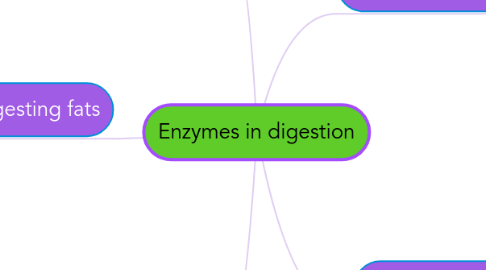Enzymes in digestion
создатель Harry North

1. How do they work?
1.1. produced by specialised cells in glands in the body eg salivary glands and pancreas
1.2. they then pass out of those cells into the gut
1.3. the gut (hollow, muscular tube) helps by squeezing the food into smaller pieces
1.4. the gut mixes the food with digestive juices and enables the enzymes to come in contact with as much of the food as possible
1.5. enzymes work on the food breaking it down
1.6. the gut moves food along
2. Digesting carbohydrates
2.1. enzymes that break down carbohydrates are called carbohydrases
2.2. amylase (a type of cabohydrase)breaks down starch
2.2.1. enzyme produced in salivary glands and digestion starts in mouth
2.2.2. amylase also produced in pancreas and small intestine but no digestion occurs inside pancreas - all the enzymes made there flow to the Small Intestine
2.3. starch and other carbohydrates are broken down into glucose in the mouth and small intestine
3. Digesting proteins
3.1. catalysed by protease enzymes
3.2. these enzymes made in the stomach, pancreas and small intestine (no digestion in pancreas so enzymes made there pass into small intestine)
3.3. breakdown of proteins into amino acids occurs in stomach and small intestine
4. what do digestive enzymes do?
4.1. break down large insoluble food molecules
4.2. to form smaller soluble molecules that can be absorbed and used by cells of the body
4.3. work outside cells (most other enzymes work inside the body cell)
4.4. after enzymes have worked on food - small soluble glucose, amio acids, fatty acids and glycerol pass into bloodstream to be carried around the body to cells that need them
5. Digesting fats
5.1. catalysed by lipase enzymes
5.2. made in pancreas and small intestine (again no digestion in pancreas - enzymes pass into small intestine)
5.3. lipids eg fats and oils that you eat are broken down into fatty acids and glycerol in your small intestine


